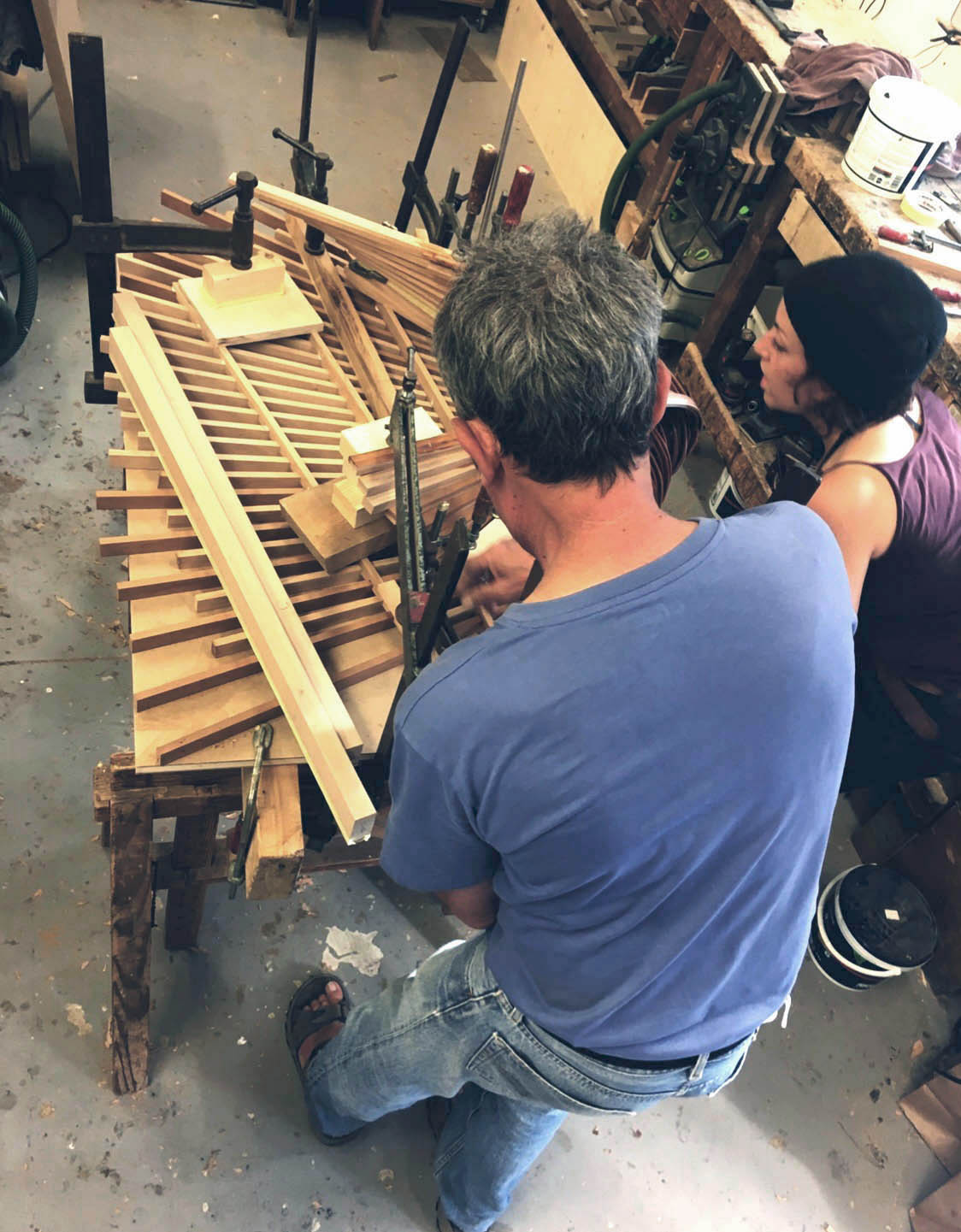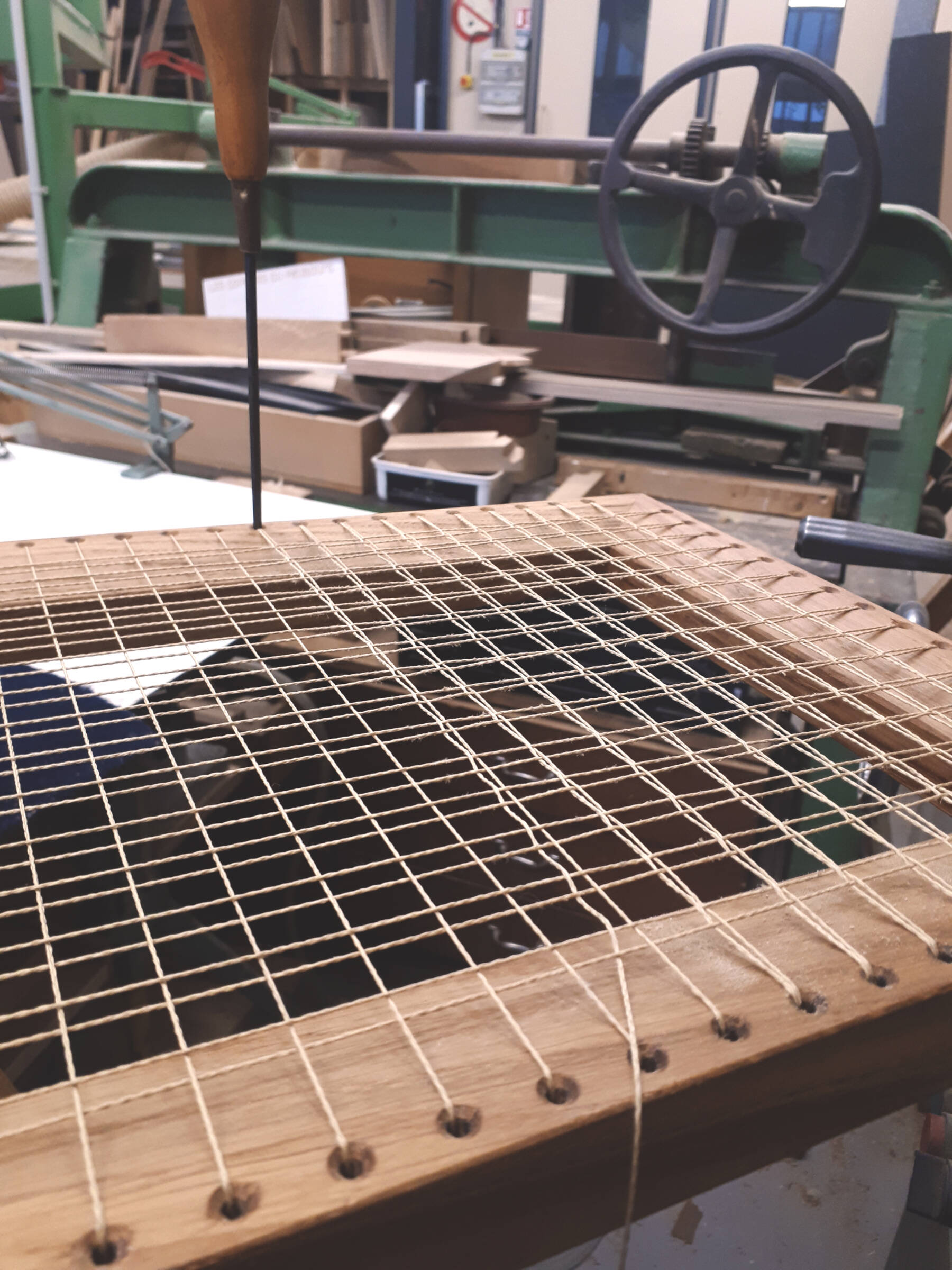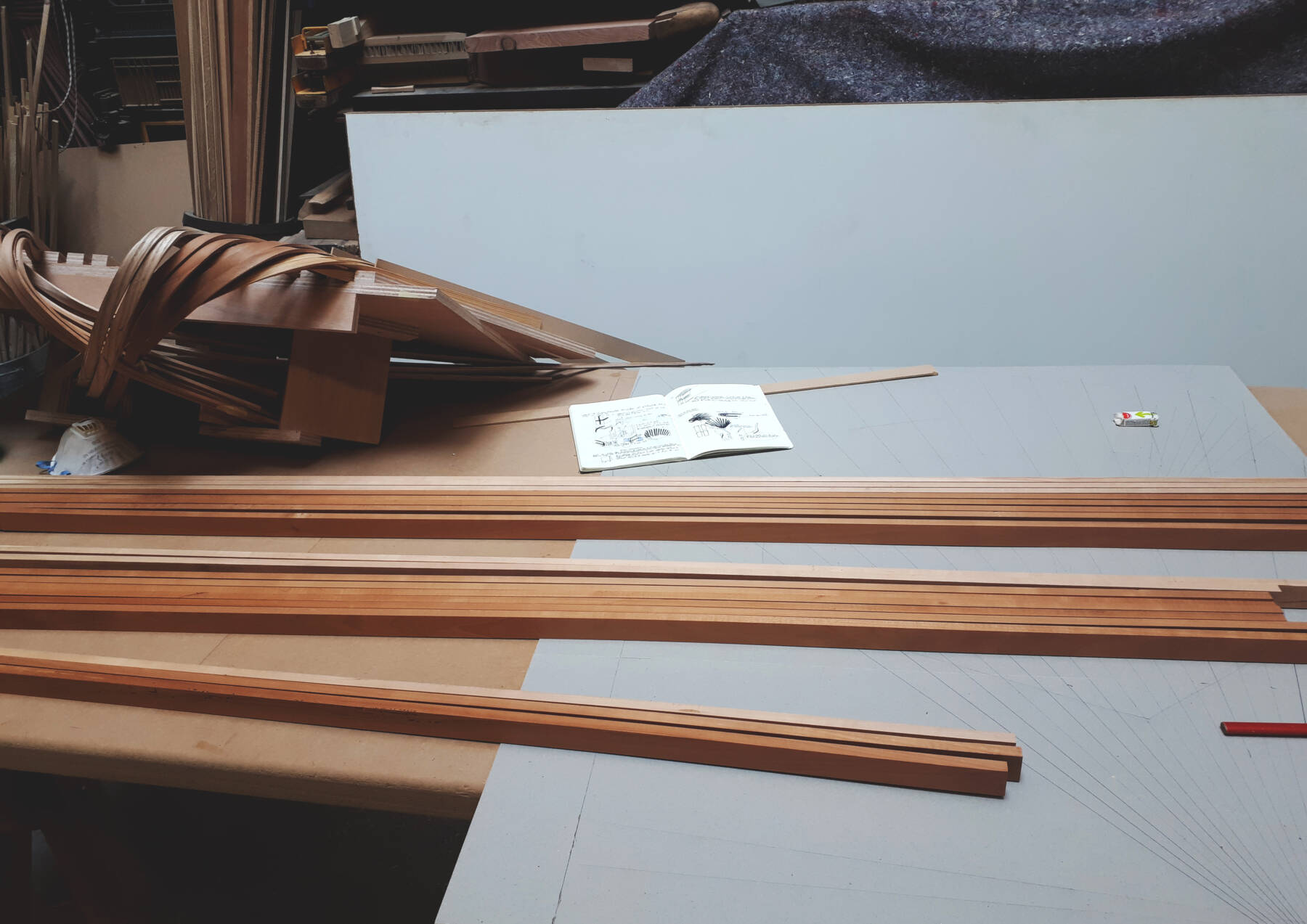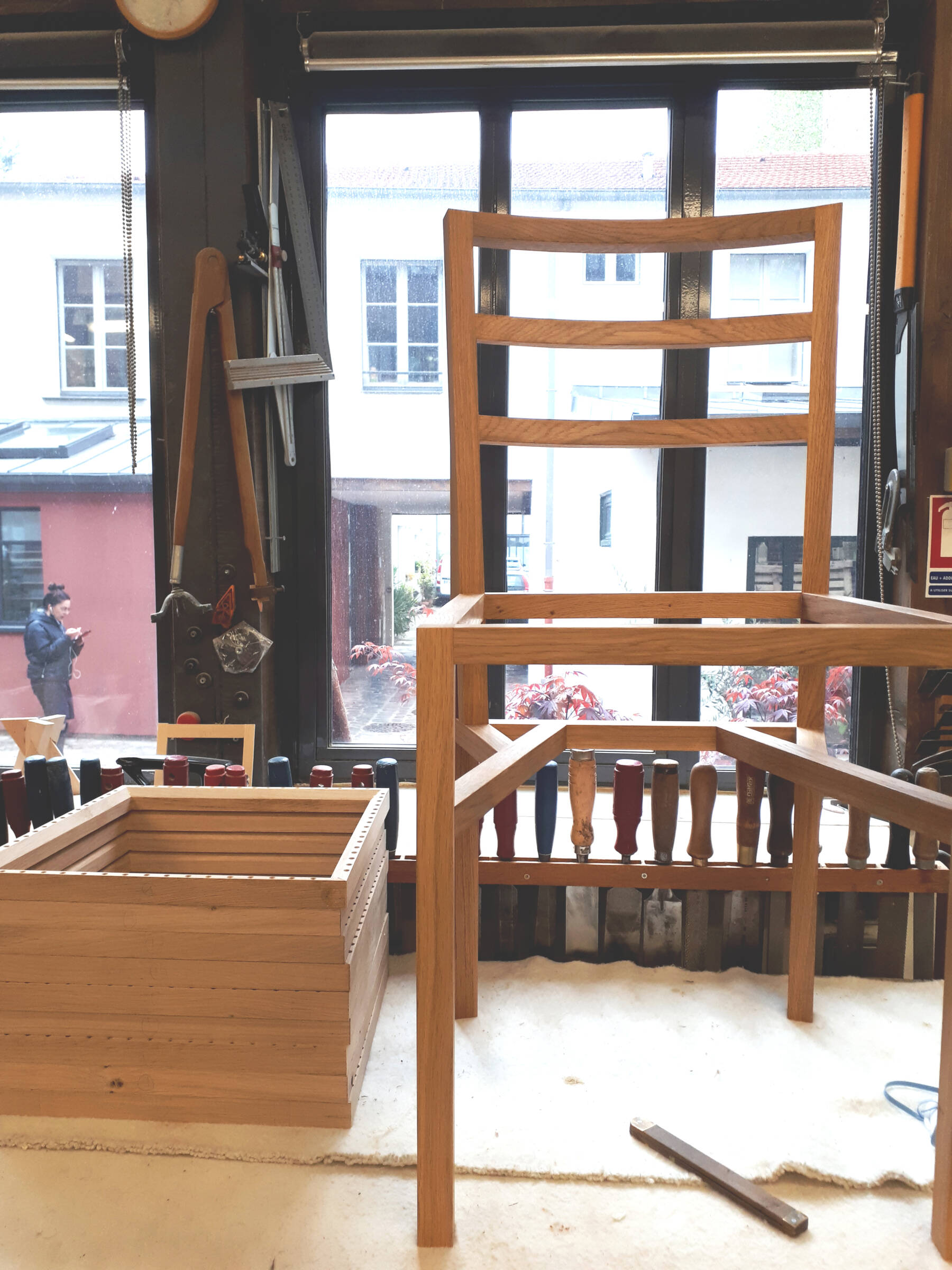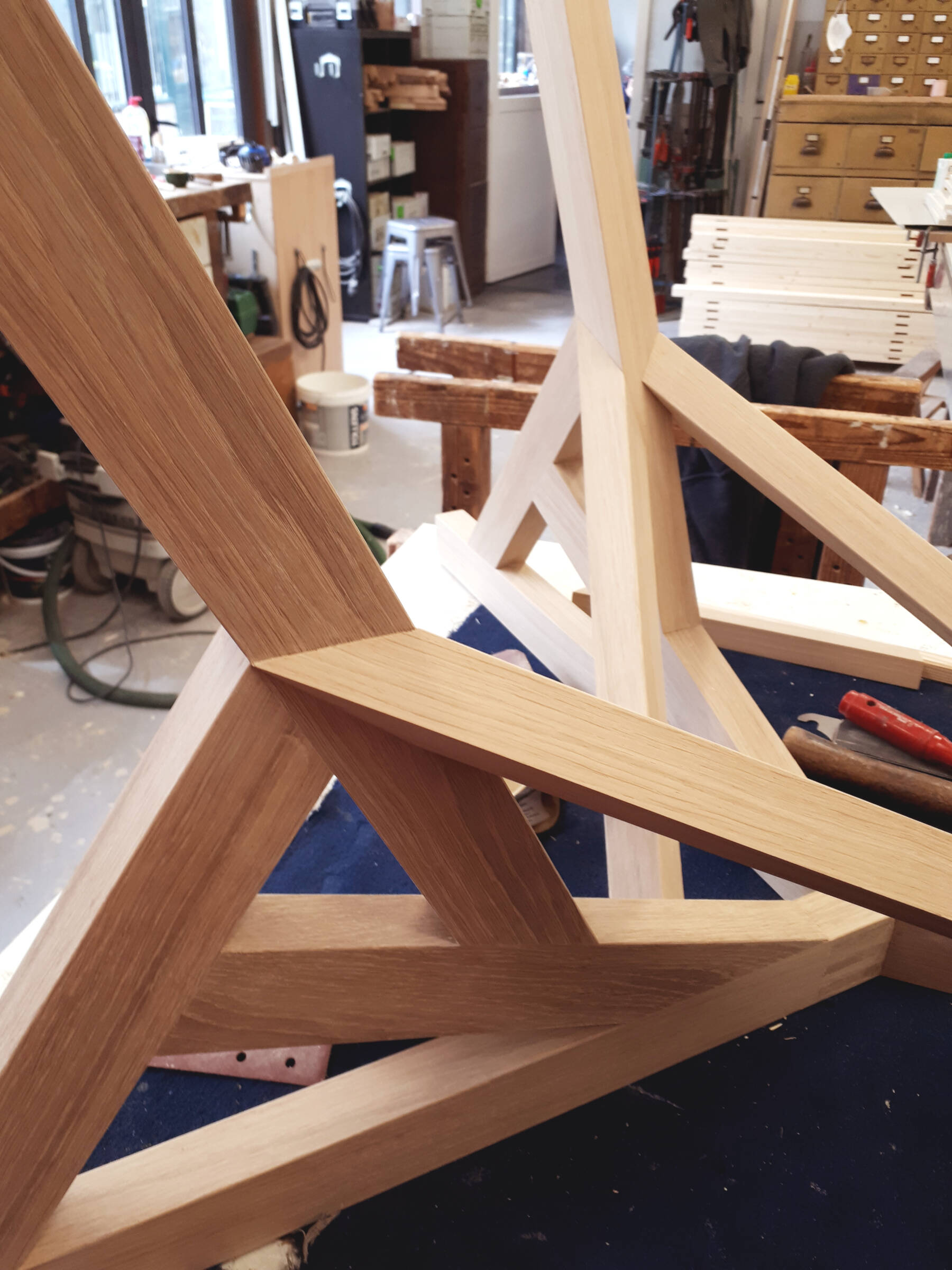Nina Fradet in Bernard Mauffret's studio - 2021
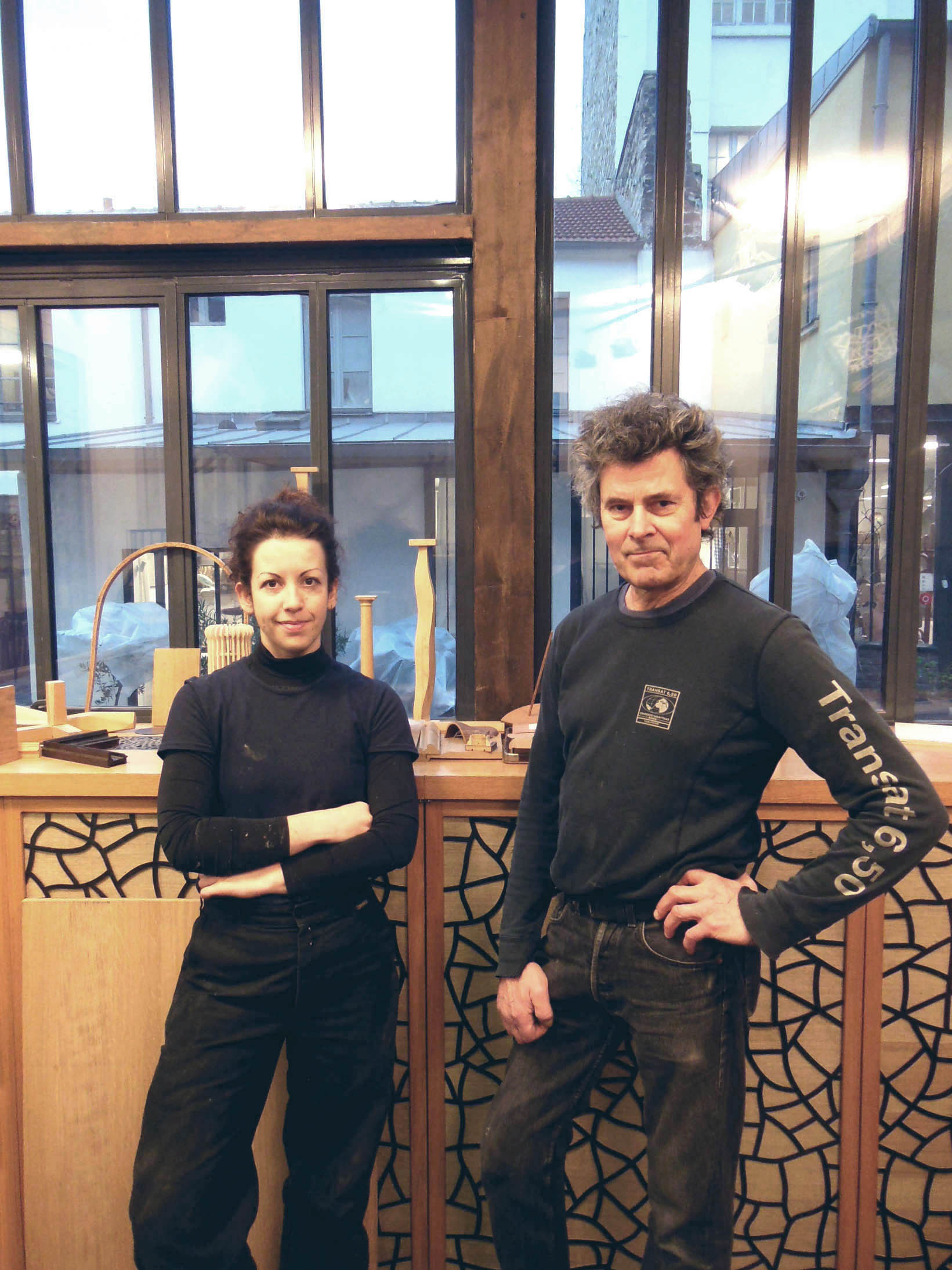
"Far beyond the technical aspects, the Savoir-faire en transmission prize will have given rise to an encounter that will mark the continuation of my career."
Nina Fradet, winner of the 2021 Savoir-faire en transmission prize, did her internship from January to December with cabinetmaker Bernard Mauffret at the Atelier Meuble Contemporain. Created in 2002, the workshop is located in the Cour de l'Industrie, in the 11th arrondissement.
Nina looks back on her experience and year of development in a detailed text combining Japan, the realisation of a variety of eclectic projects, the award of the first Mathias prize in November 2021 and the enriching transmission she received from Bertrand Mauffret.
"Sensitive to creation, I wanted to study applied arts from the age of 15. I followed this up with a BTS in Space Design to study the relationship between people and their environment. Following this conceptual approach to projects, I became aware of my attraction to materials and turned to the arts and crafts. A year's training in cabinetmaking, followed by a Diplôme des Métiers d'Art, enabled me to fulfil my potential as a student.
In 2015, during a university exchange between the Ecole Boulle and TASK University in Kyoto, Japan, I had the opportunity to learn Takezaiku, a traditional Japanese bamboo weaving technique. This immersion in a distant culture was for me as disturbing as it was eloquent. From then on, I oriented my work towards the construction of a relationship between Japanese and French cultures.
Initiating a search for cultural interactions between crafts, this project pushed me to deepen my learning of bamboo weaving by returning to Kyoto in 2018, before embarking on a two-year journey to Iceland and Japan to discover various craft and artistic practices. This trip allowed me to start my activity through different collaborations, exhibitions, and in particular by having been able to integrate an artistic residence of two months in Kyoto. Faced with the need to acquire a greater technical ease to develop my creations, I wished to return to France to complete my training in cabinet making.
The Know-How Award was a unique opportunity for me to reconcile a period of perfecting my practice with the anchoring of my projects in a professional reality.
Because of his background in carpentry, architecture, instrument making and shipbuilding, Bernard Mauffret is gifted with a multidisciplinary technique that gives him a more global vision of the cabinetmaker's craft. It is this eclecticism, which can be felt in his practices as well as in mine, that made us meet and allowed us to build a year-long transmission based on a relationship of trust and sharing.
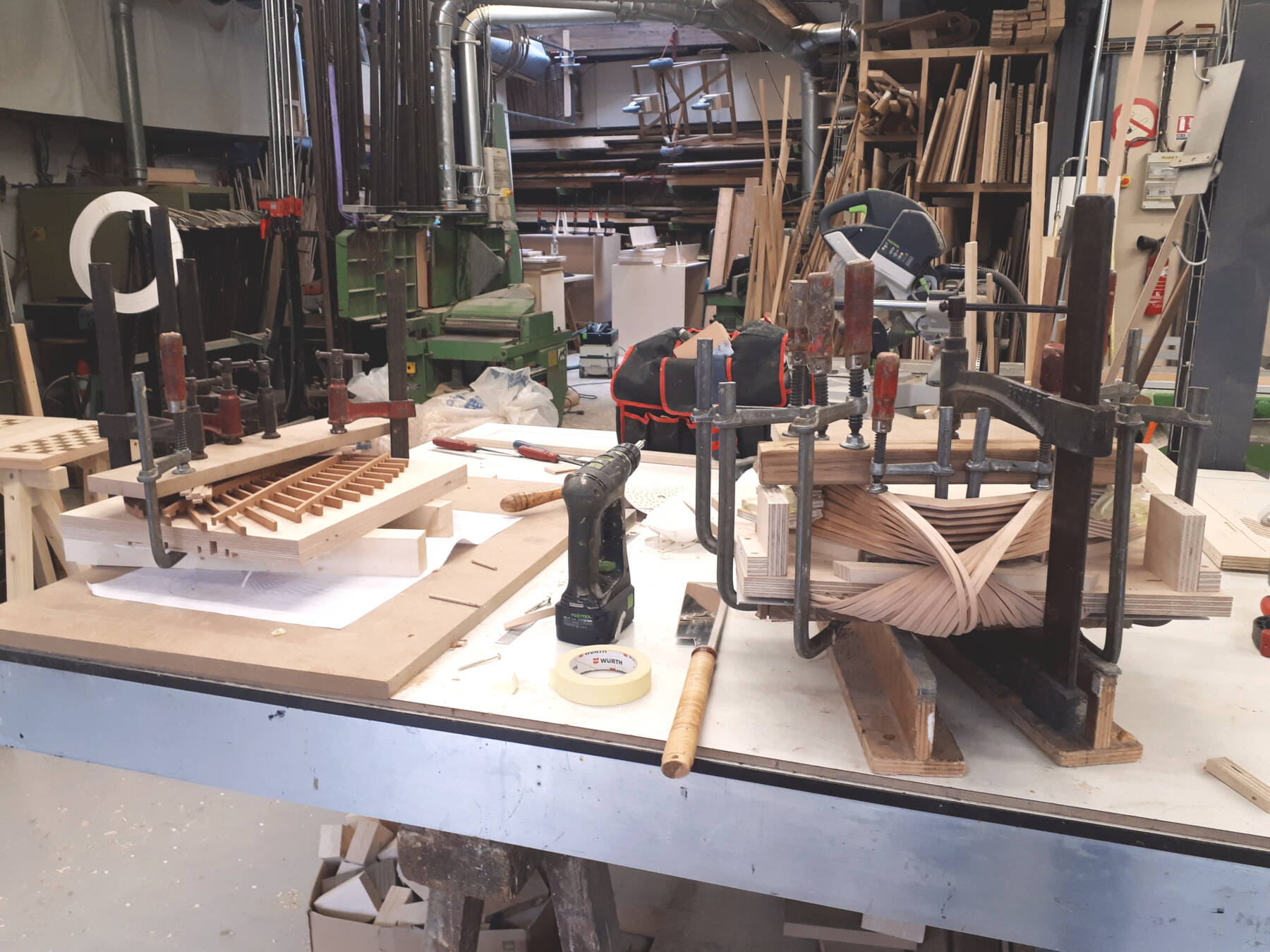
My internship project during this year consisted of the completion of a prototype of a seat based on the meeting of the techniques of cabinetmaking and Takezaiku, traditional Japanese weaving of bamboo. Having started the conceptual research during my residency in Kyoto, the major challenge was to arrive at a viable manufacturing process by confronting the theory with the reality of the material. Together, we worked out a schedule for the year that allowed me to be involved with rigour and attention in the making of the workshop's projects while having days dedicated to the realization of this prototype.
Having started my internship in January 2021, I devoted the first few months to the execution of Bernard's projects, in order to familiarise myself with the workings of the workshop. There are many approaches behind the cabinetmaker's trade. For the same assembly, the same piece of furniture, there are in fact many ways of doing things, each cabinetmaker having refined his gestures and his preferred techniques over the years. It was therefore important for me to discover Bernard's way of doing things, and above all to discover the range of mechanical and manual tools at his disposal in his workshop. A real ali-baba cave! It is indeed something impressive about him, his curiosity towards all types of tools, not necessarily destined for cabinet making, which he hunts down and rehabilitates in order to find a place for them in the workshop. It took me several weeks just to memorise the location of each of these tools, hidden behind an impressive quantity of racks. This great diversity in the means used for manufacturing is a strength of Bernard's, which he draws from his open-mindedness about the transversality between trades and techniques. In this respect, it was a real joy to confront myself on a daily basis with unknown tools, which suddenly opened up a vast field of experimentation or made a long and tedious task enjoyable.
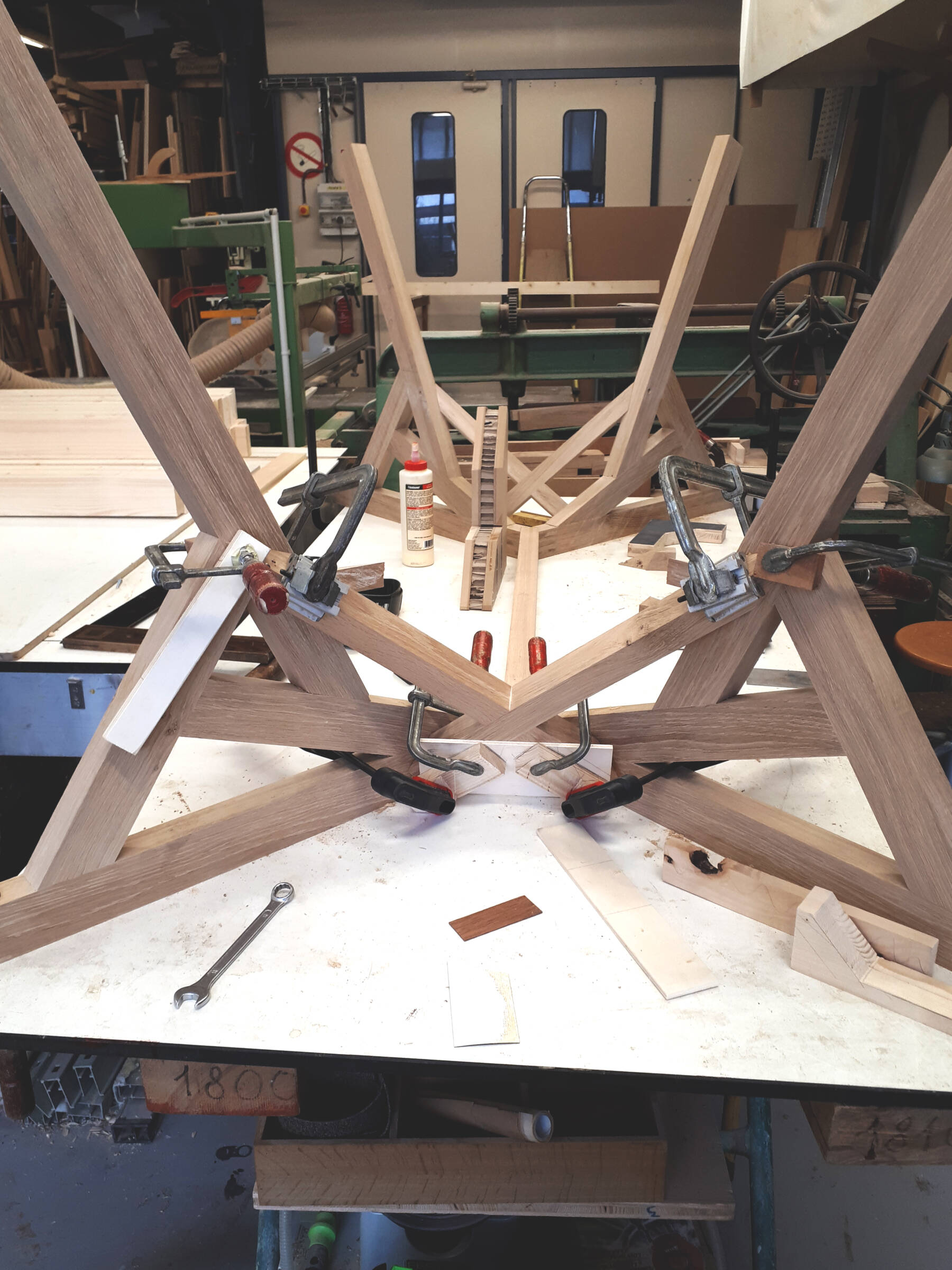
This familiarisation phase lasted a little over two months, allowing Bernard to assess my skills and to entrust me with more complex projects as they came along, and to start giving me days to start experimenting on my personal work. As the months went by, he trusted me enough to let me work for several weeks at a time, entrusting me with the workshop in the evenings, at weekends or during holidays, in order to complete the fabrication of my prototype.
In spite of projects worked on in teams, furniture making remains a field that requires a great deal of autonomy, with each person having to complete their own task. The multitude of theoretical and practical knowledge that Bernard was able to share with me, as well as the repetition of gestures required by the dense rhythm of manufacturing, allowed me to acquire greater self-confidence, necessary for greater ease in the work. This allowed me to get more involved in the study of plans, the search for technical processes and the manufacturing itself, leading to weeks of very dense work but also very rich learning.
The variety of projects carried out during the year was a strong motivator as well.Many woodworking shops are forced to make mainly fixtures and fittings for financial reasons. This type of manufacturing implies a totally different approach to traditional cabinet making, being more repetitive and less technically varied. Bernard's multi-disciplinary approach and his network of experience give him a greater diversity in the projects he carries out. We have worked on interior design, but I have also been able to participate in the making of period furniture, the making of contemporary furniture designed by Bernard himself, the making of monumental canvas frames for an artist, the repair of icons on wooden frames, the making and installation of a cedar staircase and the installation of a scenography for an exhibition at the Gobelins Museum. All of these experiences were very enriching, requiring the adaptation of techniques to the context.
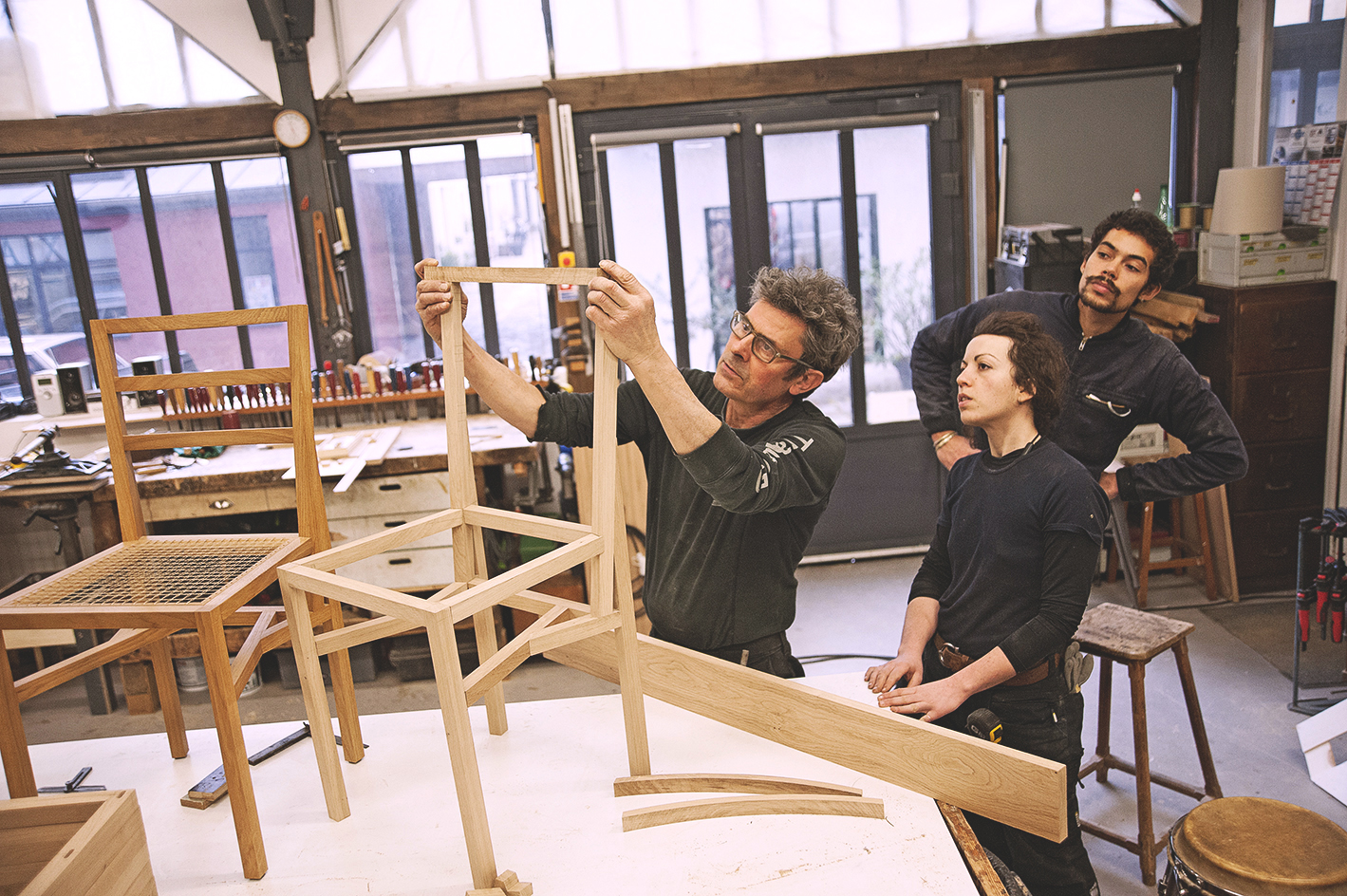
Bernard's experience as well as his singularity of being permanently open to other creative processes were precious assets in the development of my internship project. As I experimented, he was able to guide me in my questioning and direct me on the different issues to be taken into account for the production, whether in terms of technique, budget, management or positioning for the distribution of the piece. He thus enabled me to move forward independently to assume my choices in the manufacturing and implementation processes. It was then alone that I was able to complete my prototype and I am very grateful to him for that.
Having entered this piece in a competition once it was completed, I had the honour of being the first winner of the Mathias 2021 Prize last November. As this distinction accompanied the end of my internship, it only consolidated a confidence in the work and a mutual respect that would have been more tedious to build outside the context of the savoir-faire en transmission prize.
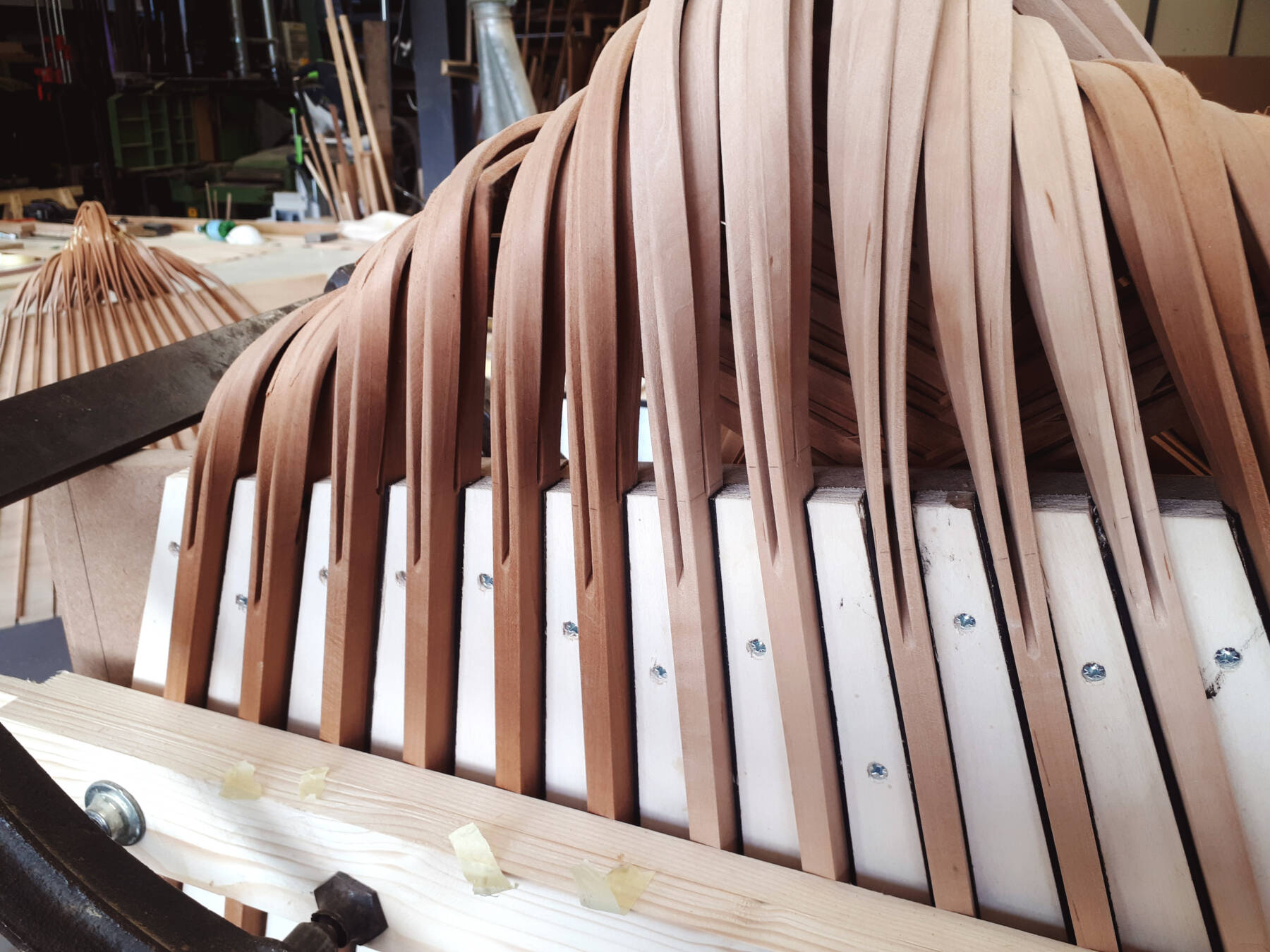
Having officially finished this course at the end of last December, we agreed to continue this adventure at an atypical pace, just like the past year. Already aiming to create my own activity for a few years, these twelve months of improvement, discoveries and efforts have become a springboard to launch myself in the development of an Arts and Crafts studio at the beginning of 2022.
Benefiting from Bernard's support in this adventure, I am starting a punctual work rhythm in his company, at the rate of two to three days per week, to be able to devote the rest of the time to the development of new projects mixing art and craft. I wish to continue the collaborations I have been able to initiate abroad, particularly in Japan, and to apply the various skills I have acquired over the past year to create new prototypes combining cabinet making and bamboo weaving, this time on an architectural scale, through a more sculptural approach to bring more poetry to these crafts.
I'm very happy with the way things turned out. Despite the many unforeseen events that occurred during the year, it was the human exchange that prevailed over the constraints a company can face. It was therefore an immense stroke of luck to have been able to take part in this year of advanced training, which today gives me a considerable professional foothold. Above and beyond the technical aspects, the know-how prize will have given rise to an encounter that will mark the continuation of my career." - Nina Fradet


